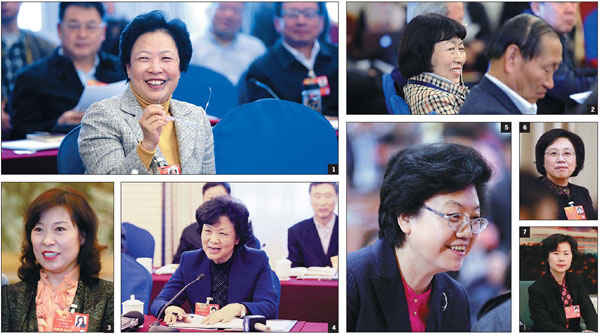Women try to hold up half the political sky
Updated: 2013-03-08 07:22
By Tang Yue, Zhu Zhe, Zhao Shengnan and He Wei (China Daily)
|
|||||||||||
Despite inroads, females still have a journey to complete, report Tang Yue, Zhu Zhe, Zhao Shengnan and He Wei in Beijing.
When Fu Ying took questions from the media at the opening session of the 12th National People's Congress on Monday, the first spokeswoman in the history of China's top legislative body stole the limelight with her intellectual demeanor and elegance.
By stepping onto the stage, Fu highlighted the growing presence of women in the country's political life, but China still has a long way to go until gender parity is realized in the elite political sphere that is traditionally a male preserve, according to female delegates and experts.
 |
|
1. Chen Jiwa, chair of the Chinese People's Political Consultative Conference of Guangxi Zhuang autonomous region. 2. Huang Liman, vice-chair of the NPC's Overseas Chinese Affairs Committee. 3. Wang Lixia, deputy governor of Shaanxi province. 4. Qiao Chuanxiu, CPPCC chair for Zhejiang province. 5. Li Bin, governor of Anhui province. 6. Yin Yicui, chair of the Standing Committee of the Shanghai Municipal People's Congress. 7. Zhang Xuan, chair of the Standing Committee of the Chongqing Municipal People's Congress. Photos by Wu Zhiyi, Zou Hong, Feng Yongbin, Zhu Xingxin and Xu Jingxing / China Daily |
"You can see a growing number of female officials and legislators in China," said Wang Lixia, deputy governor of Shaanxi province and a deputy to the NPC.
Wang was the exception that proved the rule when she joined a group of male deputies for a discussion during the NPC.
Wang, who holds a doctorate in economics, took up her post in the resource-rich northwestern province in January, joining a mere handful of women at ministerial level in China. "We women cherish opportunities such as these and are making great efforts to perform our duties and win respect from society," she said.
This year, the NPC, the most important annual event in China's political calendar, has 699 female delegates, accounting for 23 percent of the total 2,987. The number of female participants has risen by 62 from the group elected for a five-year term in 2008, while the number of delegates remains unchanged.
|
 |
However, the number of female deputies is still far below the 30 percent mark proposed for legislatures worldwide by the United Nations at the Fourth World Conference on Women in 1995.
In the world rankings of the proportion of women in legislative bodies, China slipped 13 places, from 42nd in 2005 to 56th in 2009.
However, the country had already moved to address the imbalance. In 2008, a regulation was introduced stating that the proportion of females in the legislature must be higher than 22 percent.
Rong Weiyi, a researcher with the Women's Studies Institute of China, said men and women are equal in China, legally speaking, but to achieve that nominal equality in everyday life, a greater number of women need to participate in politics.
Related Stories
Gender bias seen in job fair ads 2013-02-25 07:14
China's gender imbalance alleviates but still grave 2013-01-22 17:31
Rule against gender discrimination takes effect 2013-01-03 20:56
Guangdong urged to prevent gender imbalance 2012-09-05 15:35
Xiamen criticized for 'gender discrimination' 2012-08-29 17:01
Today's Top News
Police continue manhunt for 2nd bombing suspect
H7N9 flu transmission studied
8% growth predicted for Q2
Nuke reactor gets foreign contract
First couple on Time's list of most influential
'Green' awareness levels drop in Beijing
Palace Museum spruces up
Trading channels 'need to broaden'
Hot Topics
Lunar probe , China growth forecasts, Emission rules get tougher, China seen through 'colored lens', International board,
Editor's Picks

|

|

|

|

|

|





